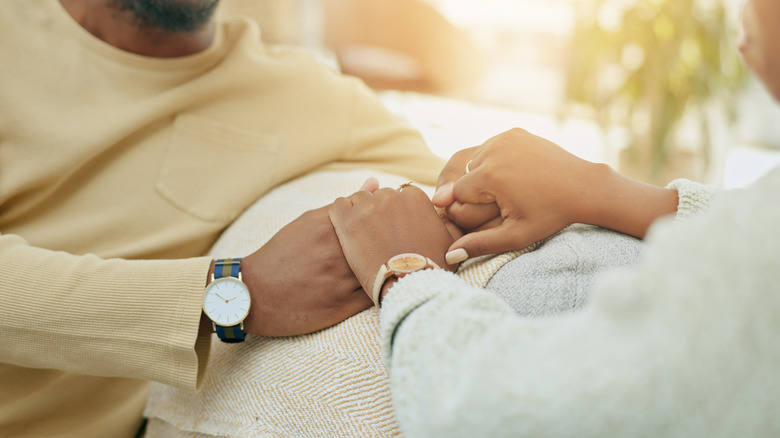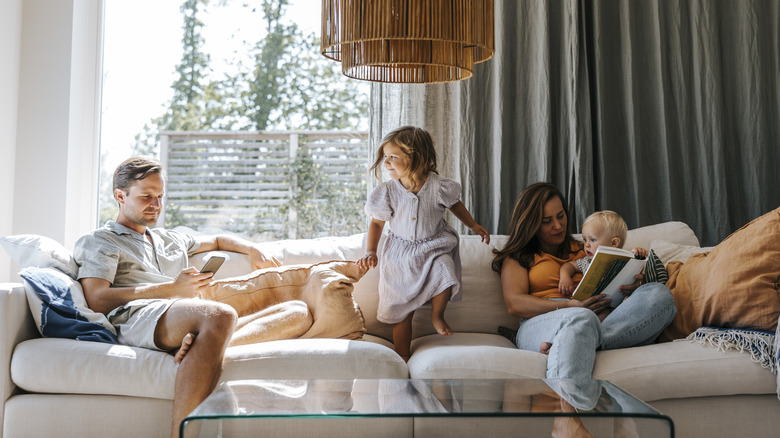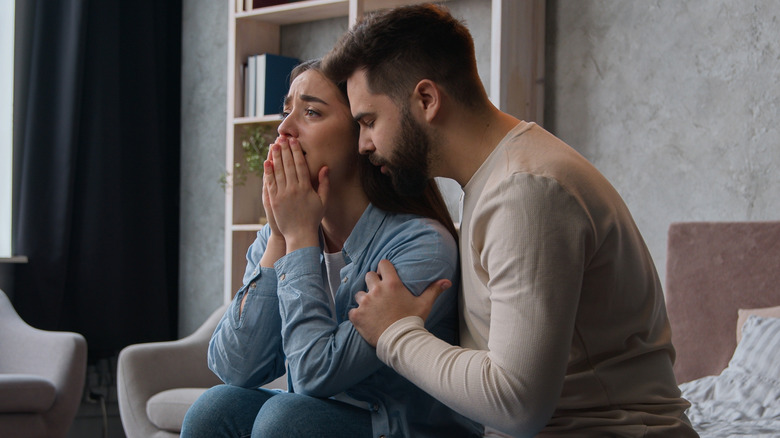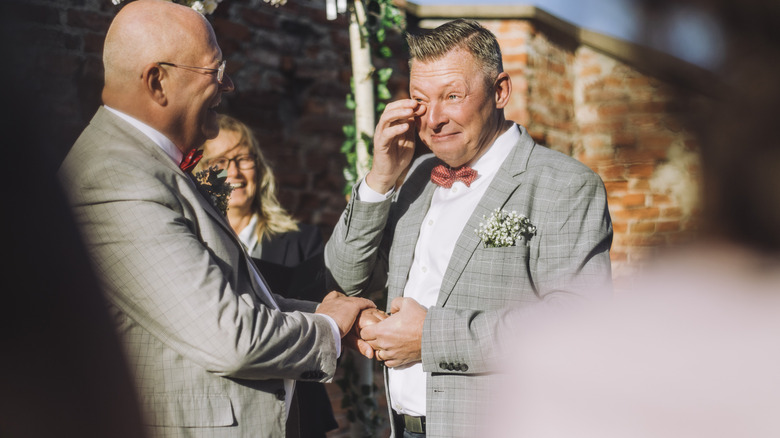11 Signs You're In A Happy Relationship, According To Psychology
We know this probably isn't groundbreaking to say, but it bears repeating: Relationships are complicated. While there are definite positives, including changes to your brain while in love, dealing with a whole other person's thoughts, feelings, life events, and values can be a lot to navigate, especially when you've got your own set to deal with. There may occasionally be times when you wonder whether this relationship is healthy for you or your partner. It's a difficult question to answer yourself, because each relationship is unique; if only there were an objective way to figure it out.
Luckily, psychologists have come to the rescue. They've studied successful relationships and found 11 key metrics that can help you determine if your relationship is going in the right direction, or if you and your partner need to correct course. From how you handle disagreements to the level of autonomy, we'll break down the science behind how these signs can indicate a strong partnership and the reasons why. Spotting any of these signs can give you insight into your relationship's health; plus they can show you a few things about what science has to say about love.
You're able to communicate easily and effectively
The scientists who study successful relationships believe that strong communication is one of the most reliable predictors for whether or not a couple will survive for the long haul. People in relationships who feel safe sharing their thoughts, from venting about work to talking about how they're feeling about the partnership, tend to report higher levels of trust and intimacy. After all, communication isn't just about talking; it's about feeling listened to. When both partners feel free to openly express themselves and be heard without feeling attacked, then conflicts are less likely to spiral into dealbreakers, and emotional bonds grow stronger.
If you and your partner both feel you can openly talk about needs, boundaries, or even small annoyances without fear of judgement, then you're on solid ground. On the other hand, if you constantly feel like you're walking on eggshells because every opinion leads to a battle or one of you tends to shut down instead of engage, that's a big sign that there's a communication gap you'll both need to work on. Notice your language when you talk: Do you say "you need to..." vs "we need to..."? Studies show that using "we" is one word that's incredibly persuasive for opening new lines communication. Start with something small or low stakes, like speaking up when you'd rather stay in and nest instead of hitting the town, or prefacing a venting session by telling your partner you just need them to listen and not feel the need to fix things.
You gossip together
According to science, that latest family drama or office dating scandal might actually be good for your relationship. A 2025 study run by psychology researchers at UC Riverside found that couples who gossiped together for around half an hour a day reported higher levels of happiness in their relationships. The researchers think this is because it reinforces the feeling that you two are on the same team; in other words, you and your partner feel safe enough to spill the tea and trust that it stays just between the two of you.
So if you notice that you and your partner have a lot to say on the drive home after a party, that's a sign of a healthy relationship. However, if your conversations often feel more like parallel monologues, you're worried they might spread what you tell them, or you hesitate before dishing out details, those could be signs you're afraid to trust them and are missing an opportunity for connection. If you're someone who doesn't like to gossip and prefers to have a brain full of empathy than scandal, that's fine, because the gossip doesn't need to be negative to count. Think of it more as having a private space to share with your partner — one that becomes another layer of closeness rather than spreading negativity or hurtful comments.
There is mutual respect
You don't need to — and shouldn't — put your partner on a pedestal and worship everything they do, but there should be a feeling of respect that goes both ways in the relationship. Psychologists point out that couples who acknowledge they and their partner are unique people with their own interests, values, and quirks, tend to build stronger, healthier bonds. In fact, these kinds of couples treat respect less like being agreeable and more like understanding that the differences they have aren't threats: They're materials for a stronger foundation.
If you and your partner can appreciate each other's passions – even when it's not your (or their) thing — that's a good sign your relationship is healthy. For example, maybe you're not into going for long runs after work the way your partner is, but you're still able to cheer them on at the side lines during a marathon. Or you may not understand or like what they do for a living, but you still show up with a smile to support them at the office holiday party. However, if one of you constantly belittles the other for their choices, dismisses their feelings, or ignores their needs, the relationship can begin to feel one-sided and head down a path where no one is happy.
You trust them to do what's best
Of course, every strong relationship has a level of trust between partners, but trust isn't just about staying faithful; it's about knowing your partner can do what's right for the relationship. Trusting your partner to do what's best spans across the board: money, parenting, events, priorities, etc. Psychologists have described trustworthy partners as, basically, being a refreshing level of boring: You know they'll keep their promises to you and will always let you know where they stand. Couples that don't report that sense of reliability may feel their relationship lacks enough security where they can grow together.
Think about when your partner has a task, like paying a bill on time or showing up to your kid's soccer match because they said they would — can you rely on them to follow through most of the time? Granted, we're all human and won't knock it out of the park 100% of the time, but if you feel more like your partner is reliable and that you can be relied on, too, then your relationship is on solid ground. However, if you or your partner tend to break promises, lean towards a Machiavellian personality type, or keep secrets about the relationship like debt or medical issues, that's a sign that your level of trust is rocky, and that can cause the relationship to crumble over time.
You can spend time together doing the things you each enjoy
Happy couples don't need to be clones of one another and, in truth, science says it's probably better that you aren't. But, are you able to do your own thing in the same space as your partner? If so, then psychologists say your relationship is going well. Being together while each immersed in their own outlet is called "parallel play," and the more couples are able to exhibit it, the more likely it is they're able to enjoy each other's company without feeling pressured to engage.
Think about the times when you're lying in bed and one of you is reading a book while the other is doomscrolling — does that happen often, or are one of you constantly feeling the need to talk and connect? If it's pretty common to each do your own thing, that's a good sign because it shows both of you can enjoy moments of quiet companionship without needing constant attention or validation. And to be clear, there is a difference between being in the same room and ignoring each other versus enjoying your hobbies with a quiet level of contentedness. If it feels more like a hostile act than one of comfort, that's not parallel play and instead an issue that needs addressing.
But you can also enjoy doing things together as a couple
Spending time apart to enjoy your hobbies is healthy, but science shows that having shared hobbies helps strengthen relationships, too. A 2021 study published in the Journal of Social and Personal Relationships found that couples who reported having shared activities or rituals had higher levels of satisfaction in their relationship. But don't feel like you need to start a podcast together or buy a tandem bike; psychologists say that even small, repeated rituals like a Sunday walk or having a weekly "must watch" show you both love is more than enough.
Luckily, it's easy to check this; just look at your calendar. Is there at least a somewhat consistent pattern of "us" activities peppered throughout? Do you have a hard stop at work so that you can make Friday night dinners together? If you're able to find small moments throughout your week that you two spend dedicated time together, then your relationship is probably in good shape. If there aren't many times you see a shared ritual or hobby, then it's the perfect time to start a new tradition together to strengthen your bond. Remember that it doesn't need to be an expensive date night or launching a business; small tasks together count.
You both have a sense of autonomy and privacy
Even if it sometimes feels like you and your partner are sharing the same brain, you're still two separate people who each need a little privacy and autonomy. Unfortunately, those words can feel a little loaded, so let's break down what they mean. Psychologists define healthy relationships as ones where you have the ability to make your own choices and feel authentic in how you live your life. Also, you're not hiding things from your partner — unless it's a good secret like surprise cake — but instead feel there are still parts of you that are just for yourself. The more you feel like you're able to decide your own boundaries, live life the way you want, and maintain a semblance of self, the more science thinks you're able to trust your partner, meaning your relationship is doing pretty well.
Think about how often you or your partner have been able to have some alone time without it being a big deal where the other person feels hurt. Do you or they feel a constant need to text during work hours or check in when the other is out with friends? Does one person get mad when the other doesn't tell them every detail about their day or what's in their head? The more privacy and autonomy are framed as insults instead of the freedom to be yourself, the less everyone feels secure in the relationship.
You're able to compromise and honor each other's needs
Every couple is going to have moments where they don't see eye to eye. Psychologists tell us that the difference between a healthy and unhealthy relationship comes down to what happens next. It seems that research shows that couples who approach disagreements as problems to solve together instead of a scorecard where one wins and the other loses end up with the stronger relationships, so if that sounds like your partnership, you're doing well.
Remember that compromise isn't a zero-sum game, so if you and your partner can hash out disagreements without them turning into cold and silent stalemates, that's a good sign that you're respecting each other's needs. If you think compromise is a touchy subject in your relationship, start small. Maybe you each take a turn picking the restaurant for date night, or you agree to split chores in a way that feels fair and not focused on the number of dishes in the sink. The more you're able to build compromise into the relationship, the less likely it is that resentment will build because you both will begin to feel seen and supported.
You feel emotionally supported and can be vulnerable
The best way to tell if your relationship is healthy might be as simple as checking in with yourself and seeing how your relationship makes you feel. Psychologists say that moments of high drama or head-over-heels lust might seem like the pinnacle of romance — similar to the kinds you see in the movies — but in reality, true love is entirely the opposite. It's a quiet, safe space for you and your partner to support each other. That might sound boring, but it's more about feeling relaxed enough in your relationship to be open than it is about losing the passion. When your partner is able to consistently show up for you, whether that's a big hug after a bad day or a bigger hug to celebrate your wins, it builds a sense of safety that fuels long-term intimacy.
Think about how comfortable you feel sharing your fears, insecurities, or less-than-perfect moments with your partner. Are they the first person you run to? Or are you worried to open up that far and show them the real you? Do you feel like your partner listens when you're vulnerable, or do you hesitate because you're afraid of their reaction? Healthy relationships have a steady undercurrent of support where you feel loved, warts and all. Don't take being vulnerable as a sign of weakness; if anything, it's one of the strongest signs of trust.
You have overall positive emotions when thinking about your relationship
When you think about your relationship, what's the first feeling that comes to mind? If it's something like comfort, appreciation, or happiness, then science says you're on the right track. Research published in the "Journal of Personality and Social Psychology" found that feelings of positivity in relationships act as a buffer during stressful times, because they help couples adjust and stay resilient when life gets messy. Meanwhile, a 2024 study in Psychoneuroendocrinology found that older couples tended to have lower levels of cortisol – the body's main stress hormone, and the same one referenced in the scientifically dubious "cortisol cocktail" — when one partner consistently reported positive emotions about the relationship.
So yes, good vibes count in a relationship. But there will also be moments where one of you gets frustrated or annoyed, so don't worry that your relationship is doomed. It's more about the balance and how overall you should feel more positive emotions than negative. Health in relationships isn't measured by isolated bad days, but instead on the emotional climate they create. So if dread, stress, or resentment feel more prevalent than happiness, that's worth paying attention to and deciding what to do about it. You may need to change your communication methods as a couple or dig deep to get to the bottom of the bad feelings festering in your home.
Others see your relationship as a positive in your life
While it's true that your and your partner's opinions are the only ones that really matter, that doesn't mean an outside perspective can't be helpful. Even if it feels like you've cracked the code and found "The One" — AKA the "mathematics of love" — psychologists note that sometimes, it's easier for outsiders to spot unhealthy dynamics because they're not caught up in the emotions of the relationship — pretty much the entire reason the "Am I Overreacting?" subreddit is so popular. If the majority of your inner circle — or redditors, if you're a really big fan of that subreddit — see your relationship as a positive part of your life, that's a good sign.
Think about the feedback you've gotten from the people closest to you, including mental health professionals. Do they smile when they see you with your partner, or do they tend to avoid social situations with the two of you and make subtle comments of concern when you catch up? Does your therapist ask a lot of questions that make you feel uncomfortable, or do they support new relationship milestones? If your relationship is generally seen as a supportive and uplifting thing that's happened to you, that's a green flag. But if you're constantly defending your partner or feel like everyone is just jealous, that's a cue to step back and take a more impartial look, or to try and see things more clearly.











